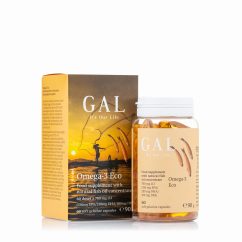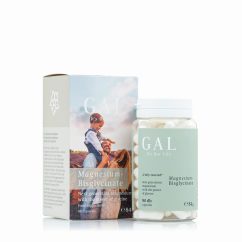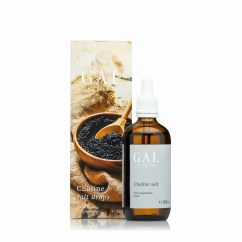
Introduction
B vitamins are essential for the proper functioning of our metabolism and for maintaining our health. Supplementation is particularly important for the elderly, those following a plant-based diet, and pregnant women, as they often do not get enough from their diet. It is also beneficial for individuals with gene mutations that increase their requirements, or for those who prefer to supplement minerals and trace elements individually, rather than through multivitamins.
Vitamin B1 (Thiamine)
What is it good for? Vitamin B1 is essential for energy production and for the proper functioning of muscles and the nervous system. Our body can store only small amounts of it, so it should be consumed daily. Without enough thiamine, the body cannot produce adequate energy from food, which initially leads to fatigue and, over time, may result in serious neurological and cardiovascular issues. One typical sign of deficiency is so-called "brain fog," i.e., lack of mental clarity.
Which form is best? The most effective forms of B1 in dietary supplements are simple thiamine hydrochloride and thiamine mononitrate. The intracellular active coenzyme forms—thiamine pyrophosphate chloride, thiamine monophosphate, and thiamine triphosphate—are among the least effective, as they must first enzymatically break down into free thiamine to be absorbed at all. Even in the best-case scenario (with sufficient digestive and other enzyme production), they are only as good as free thiamine; in worse cases (insufficient enzyme activity), thiamine pyrophosphate taken orally may not be utilized at all.(1)
Vitamin B2 (Riboflavin)
What is it good for? Vitamin B2 plays a key role in metabolism and energy production. Symptoms of deficiency include fatigue, skin problems, and dryness of the throat and lips. Its effects are mediated through two important coenzymes, FMN and FAD. Our food primarily contains these active forms, while fortified foods, milk, and supplements usually contain free riboflavin.
In the case of MTHFR mutation, B2 supplementation is especially important if B9 is taken in a non-methylated form (folate or folic acid instead of methylfolate). High-dose B6 supplementation also increases the need for B2, as it helps prevent the rare occurrence of neuropathic symptoms.
Which form is best? The best form is plain riboflavin, as it is one step ahead of "active" riboflavin-5’-phosphate sodium, which cannot be absorbed until it breaks down into free riboflavin. For active B2 to reach our cells, it must first convert to free riboflavin—something that normally happens in the gut, but may not occur in certain health conditions. (1,2)
Vitamin B3 (Niacin)
Why is B3 not included in the product? B3 deficiency occurs only in individuals who live exclusively on refined foods, as a wide variety of natural foods contain it in abundance. Thus, most people get enough from their diet.(4) Chronic overconsumption, however, is associated with risks, as it may trigger various infections and diseases. In certain cases, supplementation might be useful, but even then, we recommend it periodically—not daily, but a few times per month.
What is it good for? B3 is also essential for proper metabolism. It forms two crucial coenzymes—NAD and NADP—which are vital for many energy-producing processes. NAD is required for the function of over 400 enzymes, while NADP supports cholesterol and fatty acid synthesis and cellular antioxidant functions.
Which form is best? Niacinamide, niacin, and niacinamide riboside are all natural, well-utilized forms of vitamin B3.(5,7) There is a synthetic version—inositol hexanicotinate—which was marketed as a cholesterol-lowering drug but proved ineffective; it is only 70% absorbed and breaks down very slowly.(6) As a result, it keeps niacin levels abnormally high in the blood for extended periods, unlike the natural forms, which are 100% absorbed and cleared quickly. Since the long-term effects of consistently high niacin levels are unknown, this form—and in general, daily B3 supplementation—should be avoided.
Vitamin B5 (Pantothenic Acid)
What is it good for: B5 plays a crucial role in energy metabolism and is also necessary for the synthesis and breakdown of proteins and fats. The coenzyme A derived from it is essential for the proper functioning of numerous enzymes..
Which form is best: Calcium pantothenate is the most common and well-utilized form of B5.(1) Another form is pantethine, a B5 analog not found in food, which has been used in large doses as a cholesterol-lowering agent.(8) Pantethine is significantly more expensive but no better than plain pantothenic acid or calcium pantothenate, as it converts 100% into pantothenic acid before entering the bloodstream and is less bioavailable than calcium pantothenate.
Vitamin B6 (Pyridoxine)
What is it good for: B6 is involved in protein and carbohydrate metabolism, cell division, and proper nervous system function. It is also required for the synthesis of the neurotransmitters dopamine and serotonin, so deficiency can lead to more serious issues such as depression.
Which form is best: The best approach is to supplement with a combination of pyridoxal-5-phosphate and pyridoxine hydrochloride, but with a total daily dose not exceeding 25 mg.(1) Both forms are generally effective for most people, but some cases may benefit more from a combination. Therefore, B6 should be included in products in a mixed form, not exceeding 25 mg per day.
Vitamin B7 (Biotin)
What is it good for? Biotin plays an important role in energy production and metabolism. Deficiency can lead to hair thinning, skin issues, and various metabolic problems.
Which form is best? Plain d-biotin is the most well-utilized form of vitamin B7.(9)
Vitamin B9 (Folate)
What is it good for? B9 is necessary for amino acid and DNA synthesis and plays a vital role in many biological processes. Supplementation is especially important in the case of MTHFR gene mutations and during pregnancy.
Which form is best? B9 is often mistakenly referred to as folic acid, which is actually a synthetic oxidized form of folate found in many supplements and fortified foods. Methylfolate is the natural form of B9 and is available in four forms (considering only those with exclusively natural isomers): three calcium salts and one glucosamine salt.
- Metafolin: I-crystal form of methylfolate calcium salt
- Extrafolate-S: Amorphous form of methylfolate calcium salt
- Quatrefolic: Amorphous form of methylfolate glucosamine salt (only available in this form)
- Magnefolate: The latest version, C-crystal form of methylfolate calcium salt
All methylfolate salts are effective; they only differ in stability. The C-crystal calcium salt (Magnefolate) is the most stable, but with proper formulation and short shelf life labelling, the others are also suitable. (9,10)
Vitamin B12 (Cobalamin)
What is it good for? B12 is essential for proper central nervous system function. Along with folate and other B vitamins, it plays a role in methylation—a process that helps repair DNA and prevent inflammation. It is indispensable for vegans and important for the elderly. (Plant-based "B12" contains pseudocobalamin, a structurally different compound that not only fails to serve as a B12 source, but actually blocks B12 absorption, exacerbating deficiency.)(11)
Which form is best? All forms are acceptable, though cyanocobalamin is best avoided—not due to its cyanide content (which is minimal, even at very high doses, and less than in a single flaxseed), but because it is excreted more quickly due to a naturally produced elimination compound.
The active coenzyme forms produced in the body (methylcobalamin and adenosylcobalamin) are generated in equal measure from any form of B12, as all forms are converted to cobalamin in the cells before being utilized. (12) Methylcobalamin is the preferred form, as it is the most widely manufactured and thus available in the purest and highest quality. Hydroxocobalamin and adenosylcobalamin are less accessible, and especially the latter is only available from unreliable sources—thus, we do not recommend products containing adenosylcobalamin. The best is a product that contains only methylcobalamin, as it is converted into adenosylcobalamin in the body just as effectively as adenosylcobalamin itself, but is purer and available from controlled sources.
Warnings
If you are pregnant or suffer from hyperthyroidism, please consult your doctor, or healthcare provider before taking the product. Take a break for a few weeks after 2-3 months.
KEEP OUT OF REACH OF CHILDREN. DO NOT EXCEED RECOMMENDED DOSE.
If you are undergoing treatment for a medical condition or if you are pregnant or lactating, please consult your medical practitioner before introducing supplementary foods to your normal routine. The dietary supplement should not be used as a substitute for a varied and balanced diet or a healthy lifestyle. Store tightly closed in a cool and dry place.
References:
- Yoshii K, Hosomi K, Sawane K, Kunisawa J. Metabolism of Dietary and Microbial Vitamin B Family in the Regulation of Host Immunity. Front Nutr. 2019 Apr 17;6:48. doi: 10.3389/fnut.2019.00048. PMID: 31058161; PMCID: PMC6478888.
- Balasubramaniam S, Yaplito-Lee J. Riboflavin metabolism: role in mitochondrial function. J Transl Genet Genom 2020;4:285-306. http://dx.doi.org/10.20517/jtgg.2020.34
- https://vitaverzum.hu/hirek/266/a-riboflavin-b2-vitamin-az-mthfr-mutaciok-kulcsa
- EFSA NDA Panel (EFSA Panel on Dietetic Products, Nutrition and Allergies), 2014. Scientific Opinion on Dietary Reference Values for niacin. EFSA Journal 2014; 12(7):3759, 42 pp. doi:2903/j.efsa.2014.3759
- MacKay D, Hathcock J, Guarneri E. Niacin: chemical forms, bioavailability, and health effects. Nutr Rev. 2012 Jun;70(6):357-66. doi: 10.1111/j.1753-4887.2012.00479.x. PMID: 22646128.
- Scientific Opinion of the Panel on Food Additives and Nutrient Sources added to Food on inositol hexanicotinate (inositol hexaniacinate) as a source for niacin (vitamin B3) added for nutritional purposes in food supplements following a request from the European Commission. The EFSA Journal (2009) 949, 1-20.
- EFSA NDA Panel (EFSA Panel on Nutrition, Novel foods and Food allergens), Turck D, Castenmiller J, de Henauw S, Hirsch-Ernst KI, Kearney J, Maciuk A, Mangelsdorf I, McArdle HJ, Naska A, Pelaez C, Pentieva K, Siani A, Thies F, Tsabouri S, Vinceti M, Cubadda F, Engel K-H, Frenzel T, Heinonen M, Marchelli R, Neuhauser-Berthold M, P € oting A, Poulsen M, Sanz Y, Schlatter JR, € van Loveren H, de Sesmaisons-Lecarre A, Germini A and Knutsen HK, 2019. Scientific Opinion on the safety of nicotinamide riboside chloride as a novel food pursuant to Regulation (EU) 2015/2283 and bioavailability of nicotinamide from this source, in the context of Directive 2002/46/EC. EFSA Journal 2019;17(8):5775, 30 pp. https://doi.org/10.2903/j.efsa.2019.5775
- Scientific Opinion of the Panel on Food Additives and Nutrient Sources added to Food (ANS) on a request from the Commission on pantethine as a source for pantothenic acid added as a nutritional substance in food supplements. The EFSA Journal (2008) 865, 1-20.
- Lian Z, Chen H, Liu K, Jia Q, Qiu F, Cheng Y. Improved Stability of a Stable Crystal Form C of 6S-5-Methyltetrahydrofolate Calcium Salt, Method Development and Validation of an LC–MS/MS Method for Rat Pharmacokinetic Comparison. Molecules. 2021; 26(19):6011. https://doi.org/10.3390/molecules26196011
- https://methyl-life.com/pages/methylfolate-types
- Sabrina P. van den Oever, Helmut K. Mayer, Biologically active or just “pseudo”-vitamin B12 as predominant form in algae-based nutritional supplements?, Journal of Food Composition and Analysis, Volume 109,2022,104464,ISSN 0889-1575, Doi:10.1016/j.jfca.2022.104464.
- Obeid, Rima et al. “Cobalamin coenzyme forms are not likely to be superior to cyano- and hydroxyl-cobalamin in prevention or treatment of cobalamin deficiency.” Molecular nutrition & food research 59,7 (2015): 1364-72. doi:10.1002/mnfr.201500019
-Allergen-free
- Glutenfree
- Egg-free
- Soy allergen-free
- Dairy and lactose-free
- Free of sulfur dioxide
- Sugar-free
- GMO-free
- Vegetarian
- Vegan
- FSC paper material (CO31340)
- Packaging from carbon-neutral production
- 100% recyclable packaging
Green: The product has the described property
Red: The product does not have the described property




